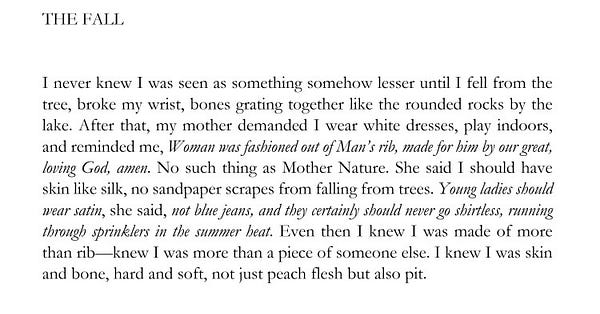Happy Friday, all!
How is everyone doing this month amid [[[gestures vaguely]]] the state of the world?
I hope you’re remembering to check in on your friends & loved ones this spring—we’re all doing our best, and a kind word can make all the difference.
Today’s post is long so you’ll want to—you guessed it—open this email up in a new tab.
Here’s what I have for you today:
Housekeeping
What I’m reading
Quotations
On envy
Tweets
Housekeeping:
My lil fiction collection comes out at the end of this month. I hope you’ll consider ordering a copy.
My press is also having a sale right now with all books for sale for $7. (Mine is a lil mini chapbook, so it’s only $3.99). Nice.
Here are two of my personal favorites from the catalog:
& here’s a great thread about the press—with insights into any small press, really:

I have a few new publications out, too:
&
What I read last week:
To read:
Ignoring The History Of Anti-Asian Racism Is Another Form Of Violence
Garth Greenwell recommends leaning into your peculiarities as a writer.
Quotations:
I was a voracious reader who devoured books in secret, in defiance of my strict evangelical parents, but when it came to my personal feelings, I allowed nothing of myself to migrate onto the page. Writing felt treacherous; a way to accidentally reveal too much.
As an adult, I can see that the smothering of the queerness that lived inside me led to long, tumultuous years of depression and misery. So much of that overwhelming despair could have been abated by the simple act of voicing the unsaid thing. All those times I cried myself sick and prayed for death, I needed the words.
The new legislation tells educators not to say gay, not to acknowledge the lived experiences of our queer and trans children, but those people who work to silence us will offer up their thoughts and prayers after a mass shooting kills and injures dozens at one of our only gay nightclubs.
It is a disconnect of morality; a space where the people who most need assistance are shunted to the side, left voiceless. We have been provided conflicting stories—you are accepted and loved, but you cannot speak about it, ever—and are expected to believe that these narratives can exist simultaneously. We know that they cannot.
To be tender, I think, means to be vulnerable.
To love a place that refuses to love you back is a heavy burden to bear.
It hurts to tell this story to you.
-Terese Marie Mailhot
This world and these rooms might not have been designed for you, but you have to walk into the room and take the knowledge you need. Walk out with it. Don’t take anything else home.
-Terese Marie Mailhot
Words are what culled my inner artist from the dead.
Art-making of any kind is as much in the body as in the brain.
On envy:
I read a lot this week, but what I’m thinking about most is The Atlantic article IT’S YOUR FRIENDS WHO BREAK YOUR HEART.
It had a lot of good reflections on friendship—and I was particularly interested in Senior’s thoughts on those that fade away (will probably talk about this in a future newsletter) and also, of course, the matter of envy within friendships.
Some quotations about envy included within the article:
Every time a friend succeeds, something inside me dies.
-Gore Vidal
We Hate It When Our Friends Become Successful.
-Morrissey
I can be a very generous sister—maternal, even—as long as I am winning.
-Jean Garnett
We envy those who are near us in time, place, age, or reputation […] those whose possession of or success in a thing is a reproach to us: these are our neighbors and equals; for it is clear that it is our own fault we have missed the good thing in question.
-Aristotle
I was interested, too, in Jennifer Senior noting that friendships aren’t always entirely “balanced,” that
Many of our relationships are predicated on subtle differences in power. Rebalance the scales, and it’s anyone’s guess if our fragile egos survive.
To be fair, I think this is sometimes—though certainly not always—true. And this sense of envy, of jealousy—whether personal or professional—is not at all pleasant, nor is it flattering. Senior writes:
Whenever I mentioned to people that I was working on a story about friendship in midlife, questions about envy invariably followed. It’s an irresistible subject, this thing that Socrates called “the ulcer of the soul.” Paul Bloom, a psychology professor at the University of Toronto, told me that many years ago, he taught a seminar at Yale about the seven deadly sins. “Envy,” he said dryly, “was the one sin students never boasted about.”
He’s right. With the exception of envy, all of the deadly sins can be pleasurable in some way. Rage can be righteous; lust can be thrilling; greed gets you all the good toys. But nothing feels good about envy, nor is there any clear way to slake it. You can work out anger with boxing gloves, sate your gluttony by feasting on a cake, boast your way through cocktail hour, or sleep your way through lunch. But envy—what are you to do with that?
Unless you’re, like, endlessly privileged or hermetic or a perfect Christian / Buddhist / etc., a little bit of envy is probably inevitable. And, as we all know, success isn’t linear or on a set timeline, so we don’t often achieve Great Things at the same time as our friends & colleagues.
Senior adds:
In recent years, I have had one friend I could have badly envied. He was my office spouse for almost two decades—the other half of a two-headed vaudeville act now a quarter century old. We bounced every story idea off each other, edited each other, took our book leaves at the same time. Then I got a new job and he went off to work on his second book, which he phoned to tell me one day had been selected by … Oprah.
“You’re kidding!” I said. “That’s fucking amazing.”
Which, of course, it was. This wasn’t a lie.
But in the cramped quarters of my ego, crudely bound together with bubble gum and Popsicle sticks, was it all that fucking amazing?
No. It wasn’t. I wanted, briefly, to die.
Now, I’m realizing I don’t really have any concluding thoughts beyond “you will likely envy a friend at some point and that’s ok.”
Unfortunately, I can relate to Senior telling her friend about how well-deserved and incredible his success was while wanting, “briefly, to die.” Does that wanting-to-die mean we’re any less supportive of friends? No, I don’t think so. I think we’re capable of setting aside our own egomania and supporting our friends’ successes because that’s what friends do.
How to cope:
Realize you’re not alone. In fact, there’s a WikiHow article literally titled “How to Feel Happy for Your Friends Instead of Jealous,” complete with illustrations. Anyway, read that.
Then, according to WikiHow:
And, always, be good to your friends despite any internal jealousy. Express joy & happiness about their successes, just as you hope they will for you. Even if something doesn’t work out for me, I know how deserving my friends are & how hard they work. I want them to get everything they want.
And, then, finally, for those people whose current lives might be enviable,
Senior explains why she didn’t, ultimately, “badly envy” her friend who had a major success:
That our friendship hummed along in spite of this bolt of fortune and success in his life had absolutely nothing to do with me and everything to do with him, for the simple reason that he continued to be his vulnerable self. (It turns out that lucky, successful people still have problems, just different ones.) It helped that he never lost sight of my own strengths, either, even if I felt inadequate for a while by comparison. One day, while he was busy crushing it, I glumly confessed that I was miserable in my new job. Then go be awesome somewhere else, he said, as if awesomeness were some essential property of mine, how you’d define me if I were a metal or a stone. I think I started to cry.
That vulnerability & continued humility (and, ideally, using your newfound cultural capital for community-building) will keep even the most envious friends from feeling alienated. In the writing world, I think it’s easy to maintain that humility—we all know how much success can be attributed to luck or good-timing within such a subjective industry. With that in mind, regardless of our positions, let’s try to lift each other up whenever we can.
Tweets:














Hope you have a great week—
-Despy Boutris




















